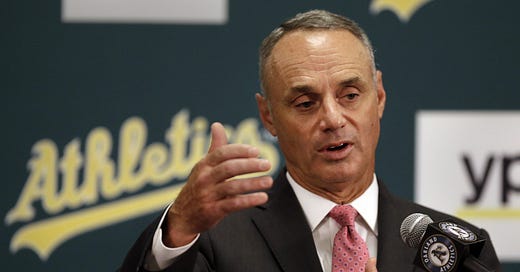The Commissioner Knows Who He Works For
The sad situation in Oakland, where the Athletics are now all-but-officially planning to leave the city that has hosted the team for 55 years, has once again put MLB Commissioner Rob Manfred center stage this month. Earlier this month, Manfred talked to reporters, and since A’s owner John Fisher doesn’t ever meet with the media, Manfred was tasked with defending the move.
And, as is typical when Manfred talks to the public, he said some pretty stupid stuff. First, he lied, saying that “there is no Oakland offer” to build a stadium for the Athletics, something that was immediately disputed by public officials in Oakland. In fact, there WAS an attempt to negotiate with Fisher over a new stadium — it just wasn’t the exact deal Fisher claimed he wanted (his demands were quite different when negotiating with Las Vegas).
Manfred also seemed to mock Oakland fans who engaged in a “reverse boycott” to protest* Fisher’s ownership, as well as refusing to criticize him for not fielding a competitive team, or for not meeting with the media, or for threatening this relocation in the first place.
*There has been some griping about the wisdom of a “reverse boycott” as a protest. After all, doesn’t buying a bunch of tickets to a game to show up and jeer the owner only line the pockets of said owner? But this criticism feels myopic to me, a symptom of our poor understanding of “boycotts” and an inflated sense of the political power of consumption choices. Yes, buying tickets and concessions means giving money to the owner, but does Fisher really care about the revenue from a single game? He has been content to tank several whole seasons, costing him attendance over hundreds of games, in pursuit of a new stadium deal. The effectiveness of the reverse boycott is not in harming Fisher’s bottom line — which fans have limited ability to impact anyway — but in demonstrating that the lack of attendance at typical A’s games is NOT due to a lack of fans. It’s due to the product Fisher is putting out, and could be rectified if a new owner were to buy the team — which is, after all, the fans’ demand.
The press conference was so full of deflections and dishonesty that it had fans once again calling for Manfred to resign or get fired. This seems to happen almost every time Manfred opens his mouth. Whether he’s calling the World Series trophy just a “piece of metal,” or threatening to shut down the 2020 season, or blaming the players for the 2022 lockout, Manfred seems to exist to make fans angry.
And that’s really not far from the truth. There is a tendency to treat a league’s commissioner as a kind of monarch for the sport. Even former player Brandon McCarthy, who had his two best seasons in Oakland, referred to Manfred as the game’s “steward.”
But commissioners work for the owners. They do have immense power over the sport, but they wield that power on behalf of the owners, not the game itself. Cutting the 2020 season down to 60 games, locking out the players in 2022, allowing owners to threaten fan bases with relocation unless they get publicly funded stadiums — none of these things are good for the game of baseball, but they are in the owners’ interest, so of course Manfred did them. He knows who he works for.
Roger Goodell occupies a similar role in the NFL: His job is to get booed for doing the bidding of the owners.** For that he is lavishly compensated. But it is important to remember that he doesn’t represent football itself. He represents the league, which means he defends the interests of the owners.
**Adam Silver obviously occupies the same role in the NBA, but because of the power of stars in basketball, he has to be more deferential than other commissioners, so he is not really the subject of the same ire.
It’s an important distinction because it’s the difference between “Rob Manfred is bad at his job” and “Rob Manfred is actually doing exactly what he was hired to do.” The goal should not be to replace Manfred — any commissioner who serves the owners is going to make the same choices (although someone else could, conceivable, be more media-savvy). The goal should be to eliminate the job of commissioner as it currently exists. There probably should be someone who exists as a steward of the game — someone to oversee big picture things, like rule changes and TV contracts and so forth — but as long as the commissioner serves at the pleasure of the owners, he will never fill that role. And as long as owners exist, they will never hire a commissioner to do anything else. So for the good of the game, let’s get rid of the owners…




